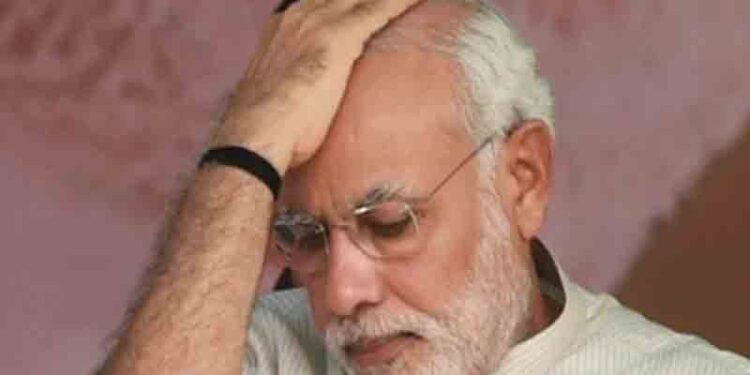New Delhi – India under Prime Minister Narendra Modi has entered a phase of diplomatic caution—or even silence—on several global crises, drawing criticism for what analysts describe as a double-dealing foreign policy. According to a recent in-depth analysis by The Wire, India’s reticent stance on issues such as the Iran–Israel escalation, the Gaza crisis, Myanmar’s military crackdown, and Russia’s invasion of Ukraine has led to growing international estrangement. This neutral or interest-based approach, critics argue, has weakened India’s reputation as a credible moral authority on the world stage.
Muted Stance on Israel–Iran Conflict
When confronting Israel’s recent military activities targeting Iran, India’s response has been conspicuous for its silence. Following missile exchanges and deaths on both sides, reporters noted that New Delhi refused to clearly condemn either party’s actions—even as international calls intensified to de-escalate tensions and uphold international norms. The Wire report highlights that India did not back United Nations resolutions that sought to impose restrictions on Israel, a stance that may hint at a bias skewed toward strategic alliances rather than principles .
Silence on the Gaza Crisis and UN Resolutions
India’s position on UN-backed ceasefire efforts in Gaza has been similarly quiet. The Israeli military’s actions in Gaza have drawn extensive international censure, yet India’s diplomatic messaging has remained vague and noncommittal. This hesitancy persists despite widespread demands—including from Western allies—for stronger positions condemning the violence. Critics believe the hesitancy arose from a desire to maintain friendly ties with Israel, a key strategic partner .
Strategic Pragmatism Over Morality
A recurrent criticism is that India’s diplomacy under Modi prioritizes strategic interest over moral consistency. The Wire’s assessment chastises New Delhi for selectively backing nations whose policies align with India’s geopolitical objectives—regardless of human rights implications.
Examples include:
- Israel, whose military support bolsters India’s defense capabilities, especially against Pakistan.
- Myanmar, where India has said little despite a brutal military coup and ongoing genocide.
- Russia, whose invasion of Ukraine met with limited Indian rebuke, overshadowed by the country’s pursuit of energy security .
These calculations reflect a foreign policy increasingly rooted in realpolitik, often at the expense of universal values like human rights and sovereignty.
Lost Support on the Global Stage
The Wire argues that this approach has cost India valuable diplomatic capital. By positioning itself as a state that puts diplomatic convenience above moral clarity, India is viewed by many as unreliable or inconsistent, particularly when compared to nations that take assertive stances on international law violations.
This has reportedly reduced India’s influence within multilateral forums, weakening its ability to build partnerships among like-minded democracies or push global reform initiatives effectively.
Roots in Modi’s Foreign Policy Doctrine
This trend is not accidental. Since 2014, India’s “Modi doctrine” has emphasized strategic autonomy and expanded global influence. This doctrine—spearheaded by External Affairs Minister S. Jaishankar—valued broad diplomatic outreach to nations like Israel, Iran, and regional Arab powers while balancing major world players .
This “act east” and “west Asia pivot” strategy has enabled India to secure investments, energy agreements, and military deals. Yet the report notes that optics often outweigh ethics: India might host Iran’s leaders symbolically, even while aligning its oil supply chains with Western powers and remaining silent during humanitarian crises.
Editorial Perspectives: Sharpening Criticism
Opinion writers in different parts of the world have noted India’s blurred stance:
- In the Middle East, critics noted India’s shift toward “friendly embrace” of Israel—arguing it downplayed Palestinian suffering and diminished India’s credibility among Muslim nations .
- Within India, some diplomatic analysts regard this as a “strategic incoherence”, suggesting that ideological gains from diplomacy may be undermined by weakened moral standing .
The growing consensus is that India’s current statecraft is more transactional than principled, offering short-term gains at potential long-term costs.
Impact on India’s Global Standing
1. Erosion of Moral Leadership
Countries seeking principled standpoints in global crises may sideline India in favor of more vocal democracies.
2. Unpredictable Alliances
Selective diplomacy makes India an unpredictable partner, deterring countries that value consistency amid global instability.
3. Weaker Global Alliances
India’s reduced voice in forums like the UN could dampen its future influence, even among non-aligned blocs pushing for reforms.
The Way Forward: Principles Over Politics?
Analysts suggest that India could regain global trust by:
- Publicly supporting ceasefires and UN resolutions in conflict zones.
- Speaking out about human rights abuses in Myanmar, Ukraine, and Gaza.
- Adopting a consistent policy anchored in international law and moral clarity—restoring a balance between strategic interests and ethical diplomacy.
The Wire concludes that by rejecting ambiguous stances and embracing principled engagement, India can reclaim its legacy as a global moral actor.
Conclusion: India at a Diplomatic Crossroads
India’s foreign policy under Modi is designed around a “national interest first” mindset, one that has brought economic and strategic gains. Yet this progress may come at the cost of diplomatic isolation, eroded moral authority, and precarious global standing.
As the world grapples with complex issues—from war crimes and nuclear proliferation to ethnic cleansing—the question is whether countries like India will act in alignment with universal norms or drift toward calculated diplomacy. If the criticism holds, Delhi may need a course correction to avoid being sidelined in future global negotiations and partnerships.

























